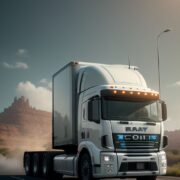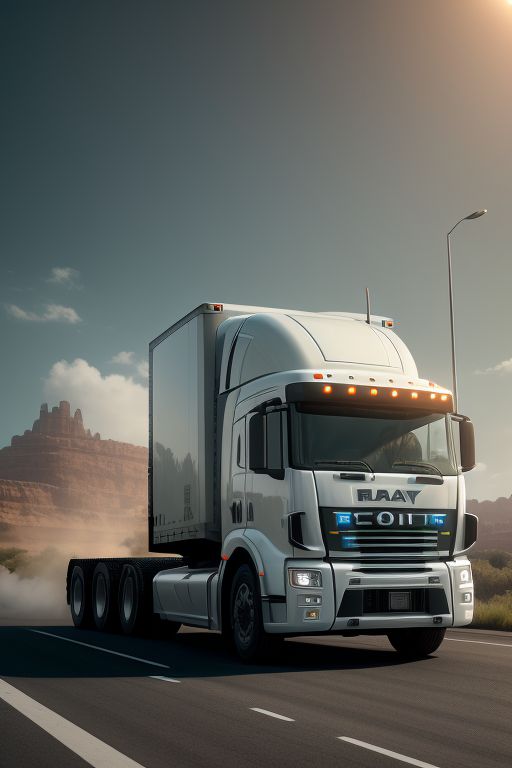AI and Trucking! Are we ready?
AI and the Trucking Industry: Revolutionizing the Road Ahead
The trucking industry is at the forefront of a technological revolution, with artificial intelligence (AI) playing a pivotal role in reshaping how goods are transported across the globe. From adaptive driving technologies to fully autonomous trucks, AI is transforming the efficiency, safety, and sustainability of the trucking industry. In this blog post, we will explore the various ways AI is being integrated into trucking, focusing on adaptive driving, self-driving capabilities, and other innovative applications. If you’ve been injury in a truck accident, you need a truck accident lawyer. Call for a FREE consultation 325-455-1889, The Low Law Firm.
Adaptive Driving: Enhancing Human Drivers
 Adaptive driving technologies, powered by AI, are designed to assist human drivers by improving safety and efficiency. These systems use a combination of sensors, cameras, and machine learning algorithms to monitor the environment and provide real-time feedback or control adjustments. Key adaptive driving features include:
Adaptive driving technologies, powered by AI, are designed to assist human drivers by improving safety and efficiency. These systems use a combination of sensors, cameras, and machine learning algorithms to monitor the environment and provide real-time feedback or control adjustments. Key adaptive driving features include:
- Advanced Driver Assistance Systems (ADAS):
- Lane Keeping Assistance: Helps drivers stay within their lane by providing steering inputs or alerts.
- Adaptive Cruise Control: Automatically adjusts the truck’s speed to maintain a safe distance from vehicles ahead.
- Collision Avoidance Systems: Detects potential collisions and can apply brakes or take evasive actions to prevent accidents.
- Adaptive Emergency Braking Systems: Applies brakes based on speed and distance to an obstruction.
- Forward Collision Warnings: Will provide warnings if the truck is dangerously close to a vehicle in front of it.
- Blind Spot Warning: Warns the driver of other vehicles in the truck blind spot.
- Fatigue Monitoring:
- AI-powered cameras and sensors monitor driver behavior, detecting signs of fatigue or distraction. Alerts are issued to encourage breaks, reducing the risk of accidents caused by drowsy driving.
- Predictive Maintenance:
- AI analyzes data from various truck components to predict potential failures before they occur. This proactive approach minimizes downtime and reduces maintenance costs.
According to TruckInfo.net, Texas had the most truck accidents in the United States. The Federal Motor Carrier Safety Administration has been working to increase awareness and implement these ADAS Systems within the trucking industry so as to reduce that number. However, there are barriers to implementing new technology.
Self-Driving Trucks: The Road to Autonomy
In addition to the above mentioned Adaptive Driver Assistance Programs, advances are also being made toward self-driving trucks. Self-Driving Trucks represent the pinnacle of AI integration in the trucking industry. These autonomous vehicles are designed to operate without human intervention, relying on a combination of sensors, cameras, radar, and sophisticated AI algorithms to navigate roads safely. The development of self-driving trucks is progressing through several stages:
- Level 1-3 Automation:
- These levels involve increasing degrees of driver assistance, where the driver remains in control but can rely on the truck to handle specific tasks like steering or braking in certain conditions.
- Level 4 Automation:
- At this level, trucks can operate autonomously in specific conditions or on designated routes. Human intervention is only required in complex scenarios or adverse weather conditions.
- Level 5 Automation:
- Fully autonomous trucks that can operate in any environment without human input. While this level of automation is still in the experimental stage, it represents the ultimate goal of self-driving technology.
Companies like Tesla, Waymo, and TuSimple are at the forefront of developing self-driving trucks. These vehicles promise to reduce labor costs, increase efficiency, and improve safety by eliminating human error. A recent CBS News Article explored the implementations and testing already happening in the United States. While it is unclear how the implementation of this technology will go, it is clear that we all need to be aware of these trucks. If you are injured in a truck accident, whether it is self-driving or not, you will need an experienced Truck Accident Attorney in Abilene, Texas. At The Low Law Firm we handle all types of truck accident cases
AI Applications Beyond Driving
In addition to adaptive driving and self-driving capabilities, AI is being applied in several other areas within the trucking industry:
- Route Optimization:
- AI algorithms analyze traffic patterns, weather conditions, and road networks to determine the most efficient routes. This not only reduces fuel consumption but also ensures timely deliveries.
- Fleet Management:
- AI-driven platforms provide fleet managers with real-time data on truck locations, driver performance, and vehicle health. This information allows for better decision-making and resource allocation.
- Supply Chain Management:
- AI enhances supply chain efficiency by predicting demand, optimizing inventory levels, and coordinating logistics operations. This leads to cost savings and improved customer satisfaction.
- Environmental Impact:
- AI can optimize fuel usage and reduce emissions by analyzing driving patterns and suggesting eco-friendly driving practices. Additionally, autonomous electric trucks are being developed to further reduce the industry’s carbon footprint.
Challenges and Future Prospects
Despite the promising advancements, the integration of AI in the trucking industry faces several challenges. Regulatory hurdles, high development costs, and concerns about job displacement are significant obstacles that need to be addressed. However, the trucking industry has to also consider the potential benefits of AI—improved safety, efficiency, and sustainability—which may make make it a worthwhile pursuit.
The future of AI in the trucking industry looks promising, with continuous advancements in technology and growing acceptance among industry stakeholders, however as with any new technology trucking companies must consider the risks associated with implementation. AI Technology is still in its infancy in terms of large scale application, but we also had infancy application with things such as air bag deployment, and over time we have seen that air bags are a safety feature that saves lives.
As AI-driven innovations become more widespread, we hope to expect a safer, more efficient, and environmentally friendly trucking industry that keeps the world moving forward. However, we must all be vigilant in ensuring safety in its application. As these technologies grow, The Low Law Firm in Abilene, Texas will continue researching and studying to stay ahead of the game and be there for your families in the event you are injured in a truck accident. Call us today for a FREE consultation 325-455-1889.

